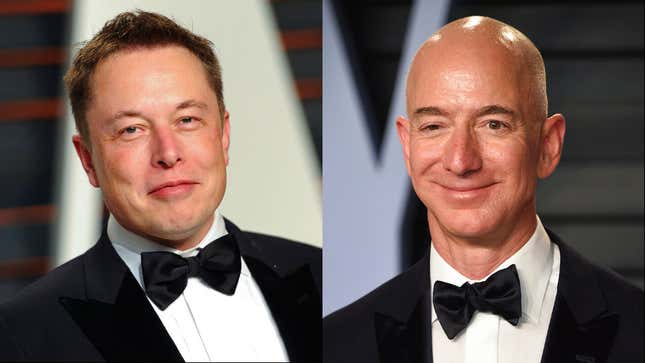
The two wealthiest men in the world—Elon Musk and Jeff Bezos—are bickering about their competing satellite internet projects, in an argument prompted by SpaceX’s recent request to move some Starlink satellites to a lower orbit.
The quarrel is happening as regulators evaluate their respective satellite plans, namely SpaceX’s Starlink and Amazon’s Project Kuiper. SpaceX is asking the Federal Communications Commission for permission to position its satellites in lower orbits than initially intended. Amazon has taken exception to this request, arguing that the move would result in excessive satellite interference.
“The facts are simple,” declared Amazon in a statement. “We designed the Kuiper System to avoid interference with Starlink, and now SpaceX wants to change the design of its system.”
The requested changes “not only create a more dangerous environment for collisions in space, but they also increase radio interference for customers,” claims Amazon. “Despite what SpaceX posts on Twitter, it is SpaceX’s proposed changes that would hamstring competition among satellite systems.” The Bezos-led company said it’s “clearly in SpaceX’s interest to smother competition in the cradle if they can, but it is certainly not in the public’s interest.”
In a tweet, SpaceX CEO Elon Musk responded: “It does not serve the public to hamstring Starlink today for an Amazon satellite system that is at best several years away from operation.”
Musk, who also runs Tesla, recently surpassed Jeff Bezos as the richest person in the world, with a net worth of $182.9 billion.
It is SpaceX’s intention to deploy an internet constellation consisting of 12,000 Starlink satellites and possibly many more. The purpose of the project is to provide high-speed internet to paying customers at any location on Earth. The company launched a public beta last year, which consists of an initial $499 startup fee for the requisite hardware followed by $99 each month. Forbes estimates that Starlink could eventually be valued at around $30 billion. Some scientists fear that the Starlink constellation, which currently consists of over 1,000 satellites, will interfere with astronomical observations and increase the chances of a collision with other satellites or space debris.
For Project Kuiper, Amazon hopes to place 3,236 satellites across three orbital planes in low Earth orbit, the lowest of which will be at 367 miles (590 km) above the surface. Kuiper would be in direct competition with Starlink, as it likewise seeks to deliver high-speed, low-latency broadband internet to paying customers. Amazon has yet to launch a single Kuiper satellite, but the FCC authorized the project in July 2020.
In a recent presentation to the FCC, SpaceX director David Goldman claimed that Amazon has organized “30 meetings to oppose SpaceX” but none to “authorize its own system,” reports CNBC. Last month, Amazon asked the FCC to limit the height of Starlink satellites to 360 miles (580 km), claiming that SpaceX satellites are working just fine above this altitude, according to CNBC.
And with this, Musk and Bezos are going at it, with each billionaire doing his best to stifle the other. I could say something cynical about all of this, but I’m sure you get the picture.
So instead I’ll try to be positive and claim that competition leads to technological advancement and enhanced consumer choice. And in this case, we should also be happy that broadband internet will soon be made available to people living in rural and remote communities or anyone who finds themselves off the beaten path.
The question we should be asking ourselves, however, is whether it’ll be worth the cost of further cluttering Earth orbit—after all, humans don’t exactly have the best track record at responsibly using natural resources.